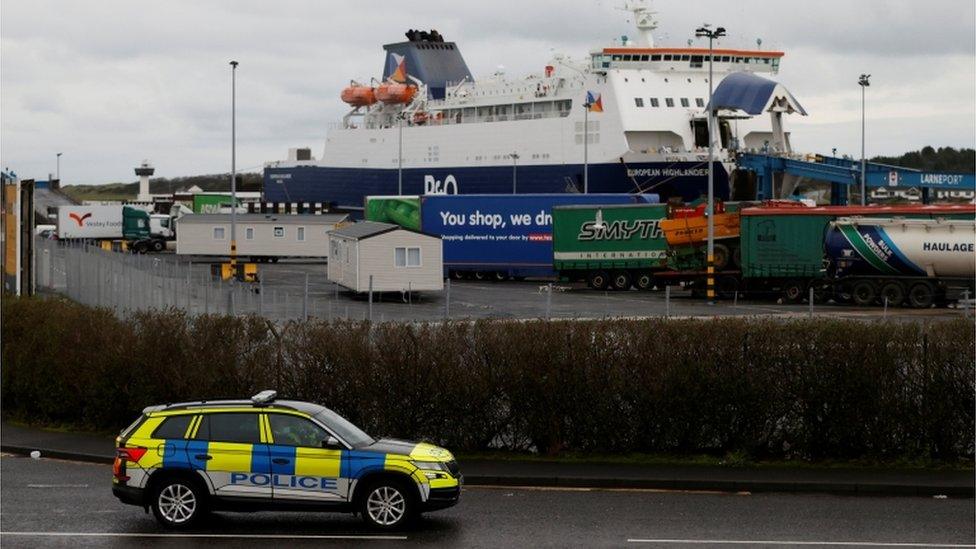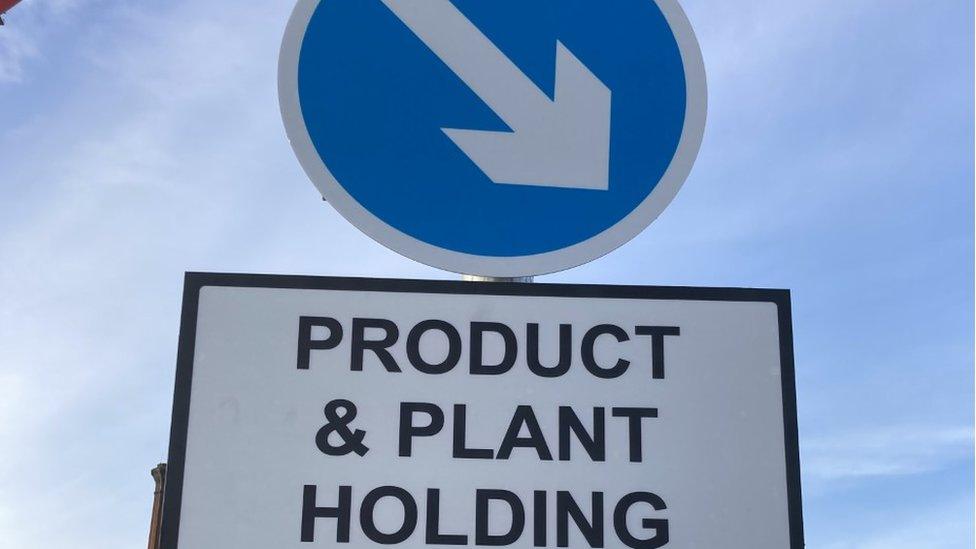Brexit: Fresh test for Irish Sea trade border processes
- Published
- comments

On Friday, the first lorries to cross the sea border arrived in NI
The new Irish Sea border processes face a fresh test on Monday as many businesses get back to normal after the Christmas break.
The first lorries to cross the sea border arrived into Belfast and Larne on Friday.
There has been at least one teething problem so far.
Some vehicles carrying food products did not have the right documents and faced a long wait in the new border control posts as that was sorted out.
The UK completed its separation from the European Union on New Year's Eve at 23:00 GMT and Monday marks the first day ports will deal with large freight numbers under the new rules as business picks up after the Christmas break.
Haulage firms say that one of their main concerns is that firms in Great Britain which are sending goods to Northern Ireland will not be fully prepared for the required new processes and paperwork.
Northern Ireland has remained part of the EU's single market for goods while the rest of the UK has left.
Under the new arrangements, many food products from Great Britain now have to enter Northern Ireland through border control posts (BCPs) as they are subject to EU processes.

At-the-scene, border control post, Duncrue Street, Belfast

"If I can just paint a picture for you, this border control post is a temporary facility because there wasn't enough time to get new permanent facilities built before the end of the Brexit transition period.
"What we have here is an area of hard standing, there is a big marquee, there is a shed, there are a couple of portable buildings and a couple of shipping containers.
"This is what the border control post amounts to here, so whenever lorries carrying food products, particularly products of animal origin, like meat, milk, eggs and fish come off the boat up at West Bank Road then they are directed round here, which is about five minutes away.
"This is the first place where inspections will take place.
"This is a 24-hour facility, so there are a couple of staff cars parked outside, there are security (personnel) on the gate and this facility has been in operation since Friday afternoon when the first lorries were pulled in here."

Declan Billington is the chief executive of John Thompson and Sons, Northern Ireland's largest animal feed processor, which employs nearly 200 people.
He said he felt as though the firm was "half in and half out" of the single market.
"All of the rules that apply to Europe will apply to moving goods to Northern Ireland," he said.
"But then, there's a whole suite of exemptions that we also have to get on top of to figure out how to move things from England.
"We're very much finding our feet… In the meantime, you just avoid buying things from the places that could create problems, you build stock and we'll be testing goods movements slowly and carefully."

The new arrangements flow from the Northern Ireland Protocol, a deal reached by the UK and EU in 2019.
Its fundamental purpose is to prevent a hardening of the border between Northern Ireland and the Republic of Ireland.
It does that by keeping Northern Ireland in the EU's single market for goods and by having Northern Ireland apply EU customs rules at its ports.
This will allow goods to flow from NI to the Republic of Ireland and the rest of the EU as they do now, without customs checks or new paperwork.
In order to reduce any potential disruption, supermarkets have been given an initial three-month "grace period" where the rules will not be enforced on the food they bring into Northern Ireland.
This is to give them time to adapt to the changes and to ensure supplies are maintained.
The UK government has also announced a three-month "grace period" for parcels, meaning those sent by online retailers will be exempt from customs declarations until at least April.
It said the grace period was necessary to avoid disruption to deliveries at a time when many shops were closed due to pandemic restrictions.
Related topics
- Published3 January 2021

- Published1 January 2021
